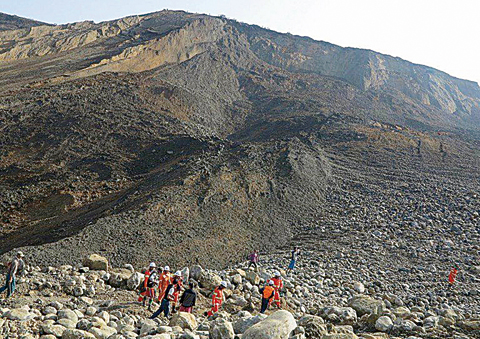Miners flouted repeated warnings in their search for jade
 YANGON: This file photo shows a view of the Hpakant jade mining area. —AFP
YANGON: This file photo shows a view of the Hpakant jade mining area. —AFPYANGON: Authorities in Myanmar used excavators yesterday to hunt for 27 people buried for two days in a landslide, officials said, the latest disaster to hit a northern centre of the Southeast Asian nation's lucrative jade trade. Deadly landslides during Myanmar's rainy season from May to October frequently bury informal scavengers, or handpickers, who scour large piles of earth for jade, production of which stood at $31 billion in 2014, advocacy group Global Witness says.
Small-scale miners who flouted repeated warnings in their search for jade at a defunct mining site were buried by muddy earth that slid off a cliff on Monday, said Kyaw Swar Aung, the administrator of Hpakant in Kachin state. "There were 4 inches of rain the night before it happened," he said, adding that no survivors or bodies had yet been pulled from the rubble. "Warnings had been issued twice not to do mining at that site."
Six backhoes were brought in on Tuesday to help with the search in the village of Ma Mone, said fire brigade official Aye Thein. "We could not perform the search when it happened, since we did not have the machinery," he said. Those trapped had come from nearby villages to pick through tailings for jade, he said. Experts say most of the stones are smuggled to neighboring China.
With only about 70,000 members, the mainly-Christian Rawang are one of Myanmar's smallest ethnic groups and live predominantly in the mountainous north, with many employed in the informal mining sector. With few regulations and little oversight in the hugely profitable sector-mostly fuelled by soaring Chinese demand-conditions are often dangerous, especially during the wet months.
"Before the rainy season, the people looking for jade were destroying the land. Now it is raining and the ground is not stable and very muddy," local resident Shwe Thein said yesterday. Dozens of people have been killed by landslides this year in the Hpakant region of Kachin state, where a major incident in November 2015 left more than 100 dead. Watchdog Global Witness estimated that the jade industry was worth some $31 billion in 2014, a huge proportion of which did not reach state coffers.
Jade and other natural resources, including timber, gold and amber, help finance both sides in a decades-long conflict between ethnic Kachin rebels and the military as they battle to control the mines and the income they bring. Since a 17-year ceasefire broke down in 2011, more than 100,000 people have been displaced due to the fighting, many multiple times. Civilian leader Aung San Suu Kyi said on coming to power in 2016 that ending the country's myriad conflicts was her top priority but an ongoing peace process is yet to yield any significant results.-Agencies










